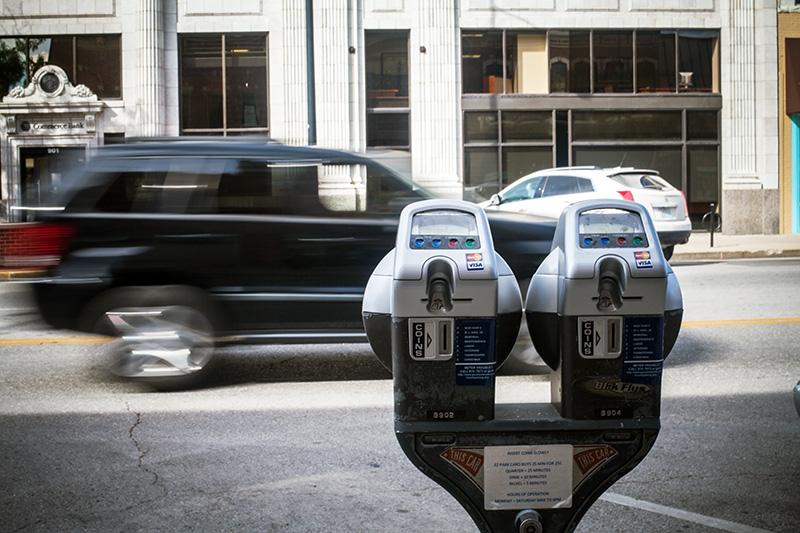
Along many streets in Columbia, meters line up in a row, counting down the time until a driver must leave or receive a ticket.
In the near future, more meters or designated spots for residents could crop up, possibly with a cost to tenants.
The Public Works Department is working to develop Residential Parking Permit Only in the Benton-Stephens and East Campus areas.
“Where we are at right now is information gathering,” said Richard Stone, traffic engineering supervisor. “We are holding a series of interested parties meetings, and that feedback will be presented to council.”
The Downtown Leadership Council hosted a public meeting Sept. 25 to discuss the project in the Benton-Stephens area.
“It was a good meeting as far as information sharing from their perspective,” Stone said. “It gave staff an idea of what’s happening in that area.”
The plan’s effectiveness is still in the air, said senior Sarah Swartz, who lives in the East Campus area.
“It sounds like Columbia is moving in a very dangerous direction for disadvantaged students,” Swartz said. “They are going into an area that is notoriously cheap and raising the costs.”
A similar program was put into place in the North Village Arts District earlier this year, but the permits were free to residents, Stone said.
“The neighborhood chose to take a route where they would install some meters on streets that were previously not metered as an attempt to offset the costs of enforcement and administering the program,” Stone said. “It’s possible other areas could have a charge for the permit or could pursue some other way or (the City) Council could pursue some other way of offsetting the costs.”
These programs come as a result of residents complaining of nowhere to park, Stone said. However, Swartz said this is not a real problem for her.
“I understand why; lots of kids park on my street every day,” Swartz said. “But it’s another bill for an underfunded student with a rising cost of living.”
The parking issues in Columbia are not bad, sophomore Marshall Maxwell said.
“City parking is way better than private parking (for me),” Maxwell said. “I don’t have a problem with parking.”
With more metered parking, Columbia residents might opt for public transportation. However, the system is not perfect, Maxwell said.
“There’s a lot of places you can’t get to in Columbia from public transportation, which is kind of weird because lots of people need to get places that are not covered by the bus lines,” Maxwell said. “I don’t think it’s adequate to cover everybody’s needs.”
Alternatives do exist, though. Graduate student Aaron Franco said the town is great for bikes.
“Columbia’s got such a good trail system, I’m able to get pretty much anywhere I need to go on my bike,” Franco said.
With the North Village project earlier this year being so successful as far as costs, Stone said he hopes the trend continues with the Benton-Stephens and East Campus areas.
“The goal is to continue to have successful programs moving forward,” Stone said.
A Feb. 8 news release from Public Works gave a timeline for the project in North Village.
On Feb. 11, meters were installed along St. Joseph Street and St. James Street, and signs were placed warning of the new system. From Feb. 11-19, enforcement consisted of warnings only, and after that, full enforcement for the meters and permits began.
“We did that as a pilot,” Stone said. “It has been successful as far as cost offsets from meters, and citations as well.”
Not having the new permit system in the East Campus area was nice, said Maxwell, who stayed in that area during the summer.
“It was free and a short walk from campus,” Maxwell said. “I would keep my car there for weeks at a time.”
Although Stone said he has been receiving positive feedback about the program, Swartz said the majority of residents do not like the proposed system.
“Unfortunately, with a transient student base, they aren’t more involved with politics,” Swartz said. “I think if you asked the residents, they would say no to this.”
Franco said he was not made aware of the meetings about things affecting residents directly.
“They should go and put a flyer on every door,” Franco said. “It’s just bad communication apparently, and that kind of rubs me the wrong way.”
Though Stone said he cannot predict how MU students will be affected specifically, those concerned should attend the meetings.
“(If) they think that it can affect them, I encourage them to attend the interested parties meetings or provide information back to us if they think it will impact them,” Stone said.
Another interested parties meeting will be held Oct. 10 in the Mezzanine Conference Room of City Hall at 5:30 p.m. If you cannot attend, you can contact Stone at (573) 874-7250 or [email protected].